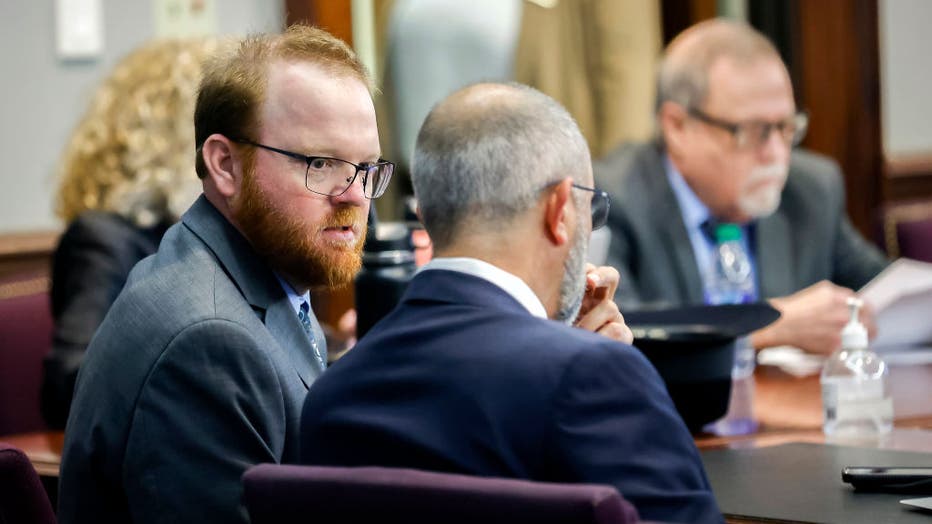Ahmaud Arbery killing: Jury selection begins in federal hate crimes trial
GLYNN COUNTY, Ga. - Jury selection begins in the federal hate crimes trial of the three men convicted of Ahmaud Arbery's murder.
Two of the men convicted of killing Ahmaud Arbery are back in court. A jury convicted Travis McMichael and his father, Greg McMichael, of killing him after chasing Arbery and shooting him in a Glynn County neighborhood.
The McMichaels and a neighbor, William "Roddie" Bryan, were convicted of murder in a Georgia state court last fall and sentenced to life in prison.
The first 50 potential jurors reported to the courthouse to begin work to seat 12 unbiased jurors. U.S. District Court Judge Lisa Godbey Wood questioned the first 25 potential jurors.
Wood asked the group: "Has anyone never heard anything about this case?"
A few moments passed as jury pool members sat silently with hands at their sides.
"I’ll let the record reflect that no hands were raised," the judge said.
One potential juror raised her hand when the judge asked if anyone already believes any of the three defendants are guilty.
A jury pool member said she knew defendant Roddie Bryan for several years.
After questioning the jury pool members as a group for about an hour, Wood and attorneys on both sides conducted follow-up questions with some potential jurors individually outside the courtroom.
Georgia's hate crimes law did not exist at the time of the killing. The U.S. Department of Justice indicted the men on charges that they violated Arbery's civil rights and targeted him because he was Black.

Travis McMichael, left, speaks with his attorney Jason B. Sheffield, center, during his sentencing, alone with his father Greg McMichael and neighbor, William "Roddie" Bryan in the Glynn County Courthouse, on January 7, 2022. (Photo by Stephen B. Mor
Death of Ahmaud Arbery
The McMichaels armed themselves and chased Arbery in a pickup truck after spotting the 25-year-old man running past their home just outside the port city of Brunswick on Feb. 23, 2020.
William "Roddie" Bryan joined the pursuit in his own truck and recorded cellphone video of Travis McMichael shooting Arbery with a shotgun.
Plea deal for the McMichaels rejected
A federal judge rejected a plea agreement, which would have avoided a trial. U.S. District Judge Lisa Godbey Wood it would have locked her into specific terms — including 30 years in federal prison — at sentencing. Arbery’s parents asked the judge to reject agreements and Wood said it would only be appropriate to consider the family’s wishes at sentencing, which the proposed deal wouldn’t allow.
Greg McMichael reversed his plan to plead guilty in the federal case days after Wood rejected the terms of a plea deal that was met with passionate objections by Arbery’s parents.
Travis McMichael also later withdrew his plea.
It's no known if there is a plea agreement on the table for the other defendant, William Roddie Bryan.
Ahmaud Arbery's family reacts
Wood rejected the plea deal after Arbery's parents argued that conditions in federal prison wouldn't be as harsh.
Prior, prosecutors asked the judge to approve the plea deals despite the objections from Arbery's family. Prosecutor Tara Lyons said that attorneys for Arbery's parents had told the U.S. Justice Department that the family wouldn't object.
AHMAUD ARBERY'S FAMILY REACTS TO GUILTY VERDICTS
Wanda Cooper-Jones, Arbery's mother, said she was upset to learn a plea was on the table. But Lee Merritt, an attorney for Arbery's mother, said the slain man's family had previously rejected the same terms and "no longer wanted to engage" with prosecutors, who "took that as a deferral."
Broad jury pool
Typically, a federal jury would be drawn from residents of Glynn County, where the case will be tried, as well as six neighboring counties that make up the Brunswick Division of the federal court system’s Southern District of Georgia.
Prosecutors and defense attorneys filed a joint motion in December in U.S. District Court, with both sides in agreement that casting a wider net for potential jurors will improve the odds of seating an impartial jury.
Prosecutors and defense attorneys in the federal case say they hope to avoid the sort of slow-moving grind that made jury selection last two-and-one-half weeks before the state trial could begin. prosecutors and defense attorneys asked the judge to approve a 14-page questionnaire to be sent to potential jurors ahead of time along with their jury duty notices in hopes of identifying jurors they agree are too biased to hear the case.
Defense's argument in the criminal trial
Attorneys argued in the criminal trial the McMichaels were justified in pursuing Arbery because they suspected that he had committed crimes in their neighborhood.
Travis McMichael testified that he opened fire with his shotgun after Arbery attacked him with fists and tried to grab the weapon.
Attorney Kevin Gough, who represented Bryan, argued the trial should be thrown out multiple times. Gough argued that civil rights activists tried to influence the disproportionately white jury. Gough requested a mistrial the day after the Rev. Al Sharpton, the Rev. Jesse Jackson and Martin Luther King III joined hundreds of pastors, most of them Black, praying and rallying at the steps of the Glynn County courthouse.
The Associated Press contributed to this report.

